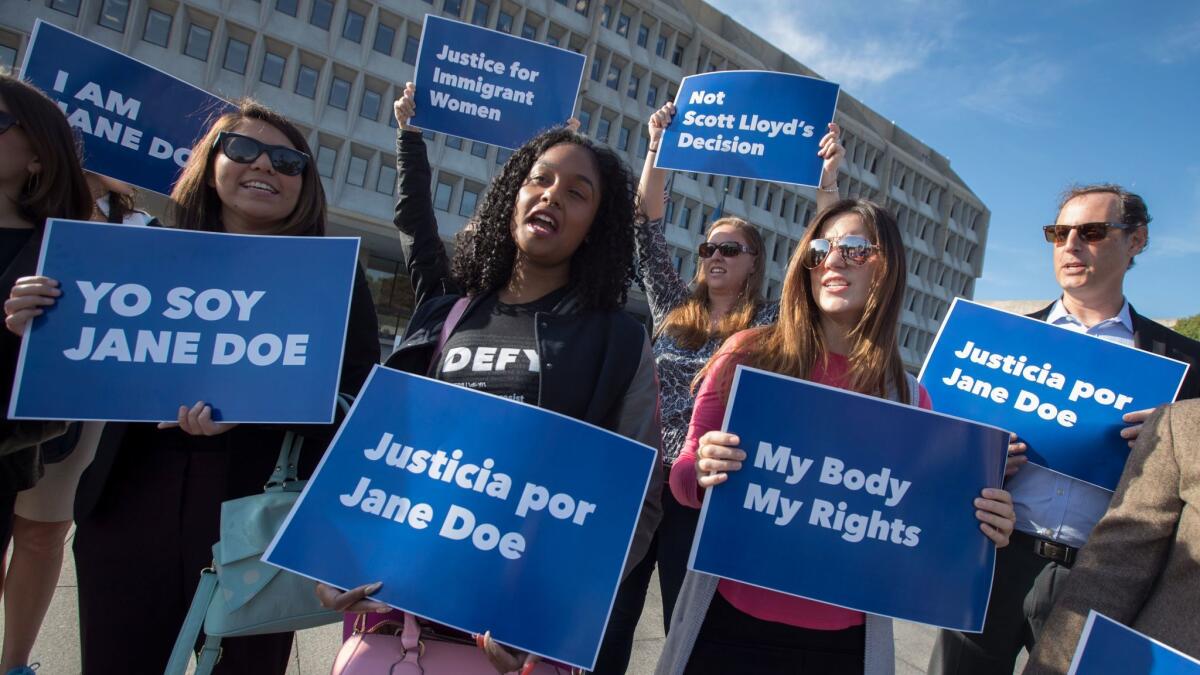How long can the Trump administration prevent a 17-year-old immigrant from getting an abortion? Case tests limit

The ACLU has asked a federal appeals court to reenter a case involving a 17-year-old pregnant immigrant in detention who has had her request for an abortion blocked by federal officials
- Share via
Reporting from Washington — The ACLU asked a federal appeals court Sunday night to reenter the case of a 17-year-old pregnant immigrant in detention whose request for an abortion has been blocked by federal officials.
The woman, identified in court as Jane Doe to protect her privacy, has been held in a federal detention center in south Texas since crossing the border illegally in September.
She is 15 weeks’ pregnant and has been seeking an abortion for several weeks. She got approval from a Texas state judge, which the state’s law requires for minors who don’t have a parent’s permission for the procedure.
But under policies adopted by the Trump administration, federal officials have tried to block any pregnant minors held in immigrant detention from getting abortions. E. Scott Lloyd, the head of the federal refugee agency that oversees detention centers for minors, is a longtime antiabortion activist, and he has refused to allow Doe to leave the detention center to go to an abortion clinic.
On Friday, a divided three-judge panel of the federal appeals court here gave the government until the end of the month to find a private sponsor who could house Doe. The majority opinion, by appeals court judge Brett M. Kavanaugh, a prominent conservative, said that solution could allow Doe to get an abortion while sidestepping the need for the court to resolve the broad, legal questions raised by the government’s policy.
The dissenting judge, Patricia A. Millett, an appointee of President Obama, objected, saying that the federal policy clearly violated Doe’s constitutional rights and that further delay was unjust. “In this context, timing profoundly matters,” she wrote.
The ACLU, which represents Doe, largely followed Millett’s lead in telling the full 10-judge court of appeals Sunday that the further delay “is extremely likely to be an exercise in futility that serves no purpose other than to keep J.D. pregnant longer.”
“Weeks have passed with no resolution for Jane Doe,” Brigitte Amiri, senior staff attorney with the ACLU Reproductive Freedom Project, said in a statement, which accused the administration of holding Doe “hostage” in an effort to prevent her from getting an abortion.
The administration is seeking to delay the process until Doe’s pregnancy is too advanced to allow an abortion, the ACLU said. Texas law does not allow abortions after 20 weeks.
“J.D. is not seeking any assistance” from the government to get the abortion, they wrote: “Her court-appointed representatives or the shelter personnel stand ready to transport her; the health center stands ready to provide the care; and private funds have been provided to pay for the procedure. All defendants must do is to step aside and stop blocking the door.”
In a response filed Monday morning, the Justice Department said that the government already has received “inquiries from prospective sponsors.” The appeals court should not take further action until the refugee office has had time to review those, they said.
Even if the government does not need to transport Doe or take other action, officials would still be “complicit” in her abortion if they allowed her to leave the shelter to have the procedure, the administration lawyers wrote. And they repeated that Doe could leave the shelter if she agreed to be deported to her home country.
“Ms. Doe arrived here illegally and refuses to leave. She has put herself to a difficult choice” of having an abortion or leaving the U.S., they wrote.
On Friday, the Health and Human Services Department, which the refugee office is a part of, said in a statement that “for however much time we are given, the Office of Refugee Resettlement and HHS will protect the well-being of this minor and all children and their babies in our facilities, and we will defend human dignity for all in our care.”
A review by the full appeals court, as the ACLU is seeking, could provide Doe with an advantage. By random assignment, the three-judge panel included two Republican appointees, but of the 10 active judges on the full appeals court, seven were appointed by Democratic presidents.
The appeals court seldom grants so-called en banc rehearings of cases, but can if a majority of the judges agree to do so.
To back up its assertion that further delay will not be likely to resolve the case, the ACLU included a declaration from Robert Carey, the head of the refugee agency in the Obama administration, who detailed the extensive, time-consuming procedures that federal rules require for vetting and approving outside sponsors for minors.
The process can take months, Carey said. Crucially, he noted, the rules, which are designed to prevent minors from harm or exploitation, ordinarily do not allow a person to be a sponsor unless he or she can present evidence of “a bona fide social relationship with the child and/or the child’s family that existed before the child migrated to the United States.”
“I do not think J.D. can be released” within the “short time period” that the appeals court envisioned, Carey said.

Twitter: @DavidLauter
ALSO
38 women have come forward to accuse director James Toback of sexual harassment
Divide in California’s GOP on display at convention: ‘We’re not offering anything hopeful’
Kelly might not be like Trump, but he seems like many Trump voters
Get the latest news from the nation’s capital on Essential Washington >>
UPDATES:
9:30 a.m.: This article was updated with the government’s response.
The article was first published at 6 a.m.
More to Read
Get the L.A. Times Politics newsletter
Deeply reported insights into legislation, politics and policy from Sacramento, Washington and beyond. In your inbox three times per week.
You may occasionally receive promotional content from the Los Angeles Times.











